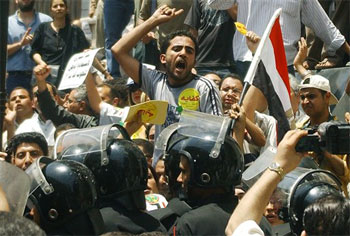 The political uprisings in Egypt for the past week have sparked the tiresome debate again – can social media create and spread revolution? The truth is that, while social media played a role in getting information out quickly (photos, videos, commentary, etc), it was Al Jazeera (a traditional media outlet) that provided mass news coverage and fed it to US newsrooms who then repurposed it. Last night however, Al Jazeera said on their website that "the Egyptian authorities are revoking the Al Jazeera Network's licence to broadcast from the country, and will be shutting down its bureau office in Cairo" but "that the company would continue its strong coverage regardless."
The political uprisings in Egypt for the past week have sparked the tiresome debate again – can social media create and spread revolution? The truth is that, while social media played a role in getting information out quickly (photos, videos, commentary, etc), it was Al Jazeera (a traditional media outlet) that provided mass news coverage and fed it to US newsrooms who then repurposed it. Last night however, Al Jazeera said on their website that "the Egyptian authorities are revoking the Al Jazeera Network's licence to broadcast from the country, and will be shutting down its bureau office in Cairo" but "that the company would continue its strong coverage regardless."
“It's actually been interesting to watch as a case study in the enduring power of traditional media. Were it not for Al Jazeera and the coverage it's providing, which is making its way to US newsrooms and inspiring/providing constant compelling visuals, the 90%+ of Americans who aren't on Twitter every waking moment would have no concept (or only the official Egyptian gov't concept) of the happenings on the ground over there,” said Shayna Englin who helps nonprofits organize around causes.

Jake Brewer, formerly of the Sunlight Foundation, raised a good point about the traditional role of media and its use of social media to document the footage that reporters are capturing on assignment. "If there is a particular story to be had about media's role in Egypt, I certainly don't believe it's about Twitter. Good god, no. If anything, it's probably more about how those who end up placing the images widely distributed via TV/traditional channels have relied very very heavily - if not exclusively in some cases - on social media channels to identify the photo that becomes worth 1000 words, and make sure it gets out to the public."
Another important factor in this debate is that the Egyptian government shut down the internet. There have also been reports of the government cutting off mobile carriers. Yet due to old fashion organizing on the ground, the protests have escalated.
Similar discussions surfaced last year during Iran’s Green Revolution, when many people using social media overlaid a green shade to their avatars and profile pictures to show their solidarity with the people of Iran. The Iran related hashtags also trended on Twitter. A few months later I had the opportunity to hear from researchers who spent time in Iran and were documenting the protests. They stressed that while the internet (particularly the use of google groups which they had to change up often due to government crackdowns) and social media were useful in helping to organize and spread information, most of the work was done on the ground. Also of note, was that many Iranians were insulted to hear that people were calling it a “Twitter Revolution.” Perhaps it was for Americans, but not for the people of Iran, said one of the researchers.
Social media certainly has its role as a communications and organizing tool to help spread information fast, but it also comes with consequences, particularly in countries where there is major political unrest.
“The Net Delusion: The Dark Side of Internet Freedom,” a book by Evgeny Morozov, talks about how social media has huge appeal for secret police forces. “A dissident’s social networking and Twitter feed is a handy guide to his political views, his career, his personal habits and his network of like-thinking allies, friends and family. A cyber surfing policeman can compile a dossier on a regime opponent without the trouble of the street surveillance and telephone tapping required in a pre-Net world,” said the NYT who was discussing his book.
“Since that revolt collapsed, Iran has become a cautionary tale,” said the NYT. "The Iranian police eagerly followed the electronic trails left by activists, which assisted them in making thousands of arrests in the crackdown that followed. The government even crowd-sourced its hunt for enemies, posting on the Web the photos of unidentified demonstrators and inviting Iranians to identify them.”
Like any communications tool, social media has its benefits and challenges as a medium for social change and is only one channel among many when organizing and spreading information.
"For me, this whole moment is a marvelous case study of how just about every channel for communication we have is being used to connect more people to what's going on in every possible way - and make them not
just end-users, but part of a conversation," said Brewer.
More Resources:
- Will the Revolution be Tweeted
- Revolutions: Don’t Shoot the Social Media Messenger
- Spotlight Again Falls on Web Tools and Change



COMMENTS